When visiting Morocco, the food is something that must be experienced. But, you’re likely to find the dining experience is very different than what you may be used to and can be overwhelming. These ten tips should help take some of the anxiety over eating away and help you prepare to enjoy some amazing Moroccan food!
1) Set down the silverware
In Morocco silverware is rarely used. Meals are eaten communally from a large dish – not on individual plates. You’ll use bread as silverware not a fork or spoon. Sure, most places can accommodate visitors who prefer their own plate but there’s something really special about sharing a tajine or plate with your tablemates. In rural areas and in some family homes people might even use their hands to eat or to move items around.
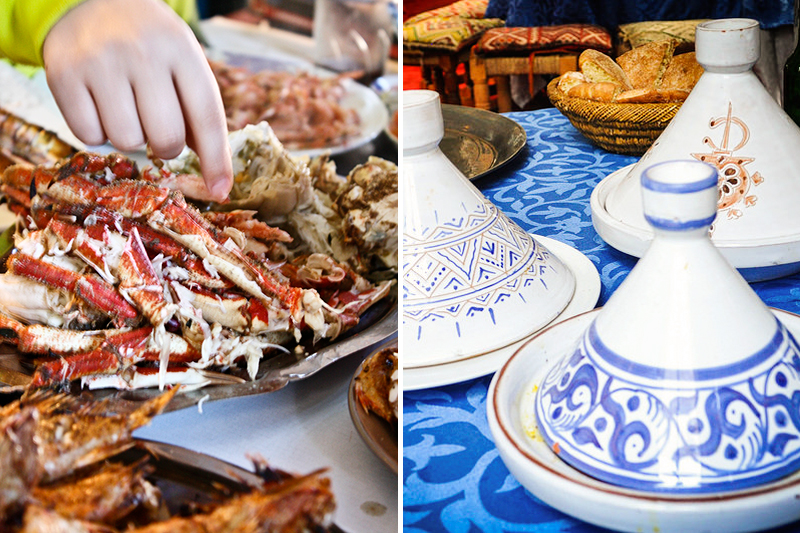 Photo (left) by Amanda Mouttaki, photo (right) by Katie Bordner via CC, adapted by ParTASTE
Photo (left) by Amanda Mouttaki, photo (right) by Katie Bordner via CC, adapted by ParTASTE
2) Keep to your immediate triangle
Just because everyone is eating from the same dish, don’t think there are no rules. You should eat from the triangle that is immediately in front of you. Don’t reach across to someone else’s area even if they might have something you would like. You’ll notice tajines or couscous are prepared in a way that each person will get a little bit of each component of the meal – that’s not an accident! If you’re eating with Moroccans you might discover the hostess will use her hands to give you a piece of meat or a favorite vegetable. Try not to balk at this, it’s an honor and sign of hospitality that they want you to have the best pieces. Guests always get the best pieces!
3) Remember “right”
If you’re left handed you may have a little bit of a challenge in Morocco. Eating is done with the right hand. The left is considered unclean. For example, when eating a tajine people will break off a small piece of bread with their right hand and hold it between their thumb and first two fingers. It’s then used to scoop the food and sauce. If you’re left handed don’t worry too much, most people understand and will just want you to be comfortable.
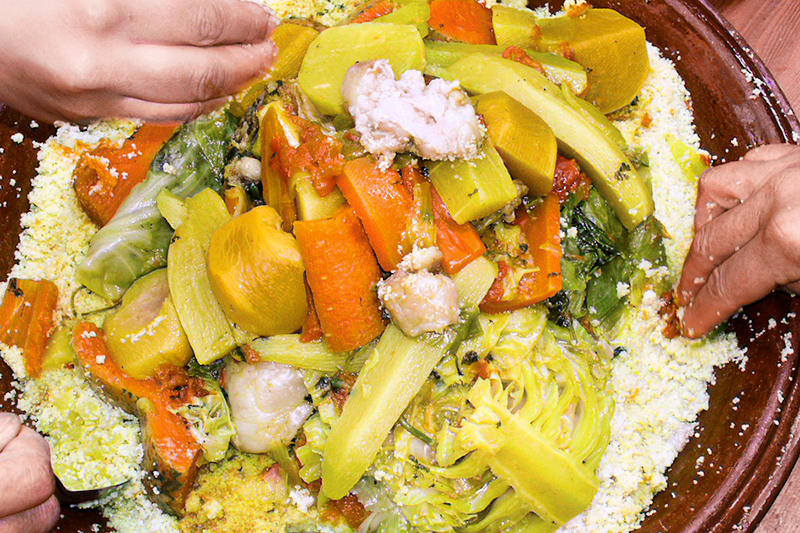 Right hand only please. Photo by Kali Fire via CC, adapted by ParTASTE
Right hand only please. Photo by Kali Fire via CC, adapted by ParTASTE
4) Allergies are uncommon
Allergies are uncommon in Morocco and the concept of choosing not to eat something just because is hard for many to wrap their heads around. Some things are more familiar than others. For example, many people now know what it means to be a vegetarian and are familiar with nut and shellfish allergies. Gluten allergies and more obscure allergies are not as well understood. The reason is simple, for many people the choice of eating or not eating certain things doesn’t exist. They eat what they can afford, period. If you can, try to eat foods that naturally don’t contain allergens you react to instead of trying to have a typical recipe changed to remove the allergen. This will help you stay safe. The Moroccan Arabic word for allergy is hassasiya and is really good to know so that you can be sure you are understood in the case that you have a severe allergy to a certain ingredient.
5) In Morocco, bread is your friend!
Moroccans love and eat a lot of bread. Not only is it used as silverware for eating tajines and salads but it’s breakfast and snack food too. There are many different kinds of bread from small round loaves to tandoori cooked rounds in the villages and dozens of varieties in between. As you might imagine, Morocco is a very hard place to be gluten free or low carb.
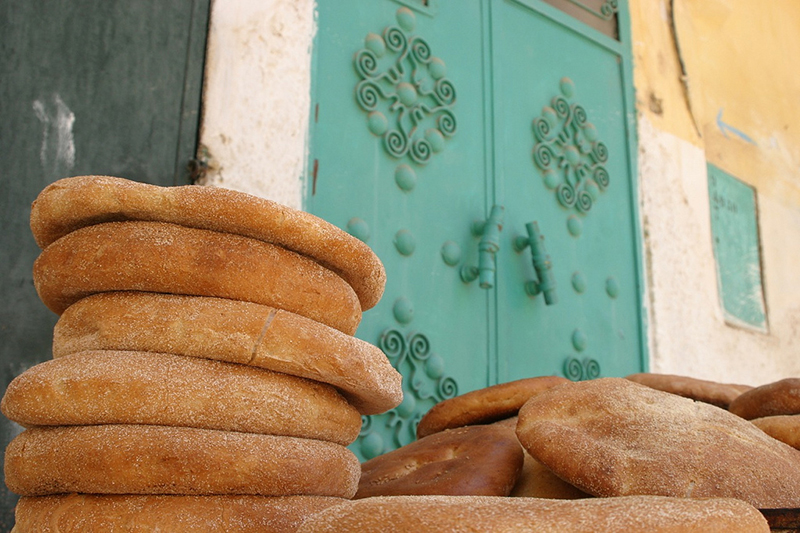 Piles of fresh Moroccan bread. Photo by Green Prophet, via CC
Piles of fresh Moroccan bread. Photo by Green Prophet, via CC
6) The best Moroccan food isn’t found in restaurants
Sadly, the best Moroccan food you’ll eat won’t be in a restaurant in Morocco. There are very few that make really good Moroccan food. It might seem like this makes no sense but the reality is Moroccan people do not go to restaurants to eat Moroccan food – they stay at home! That’s where the best Moroccan food is. If you can’t get an invitation, then eating in a riad is a good option. The women who work in the kitchens of the riads cook the same types of food they would make at home. Don’t fall under the impression that upscale, expensive restaurants are going to provide really good Moroccan food, in most cases they don’t. You’ll pay for the experience but not for the food. Some riads are open only as restaurants while others offer accommodation and dining. If you choose to stay at a riad, start by trying the food on-site and then branch out to other riads. Many riads offer dinner to non-guests, but you’ll need to call ahead and make reservations. If you are dining in a location that also has rooms for guests, you should be aware that people are staying there and keep your voice level in check. Typically, the cook won’t leave the kitchen but it’s always appreciated when you show gratitude and share with them that you enjoyed the food. There’s nothing better than hearing someone enjoyed your cooking!
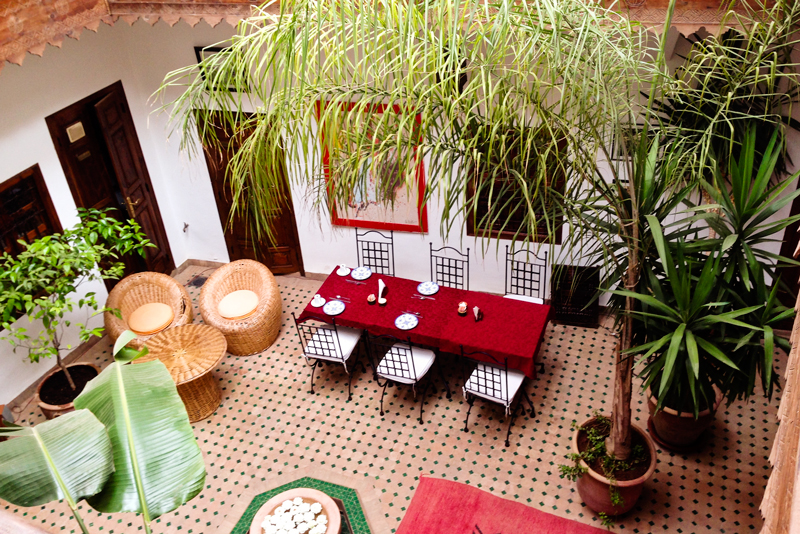 Riads are a great choice for accommodation and eating in Morocco. Photo by Andrew Nash via CC
Riads are a great choice for accommodation and eating in Morocco. Photo by Andrew Nash via CC
7) Eat on the streets
You might not discover the best sit down meal in the restaurants of Morocco but you can find really great street food! Many people are nervous about eating food from the shops lining the streets but you shouldn’t be. Do some research, how clean is it? Are there lots of locals eating there? If the food is fried, is the oil dark or cloudy? If all is well, go for it! Some street food specialties to try;
- Msemmen, plain or stuffed with spices
- Juices of all varieties
- Grilled meats
- Sfinge and Kringo (doughnuts)
- Ma’akouda (a potato patty)
- Harira or B’ssara (soups)
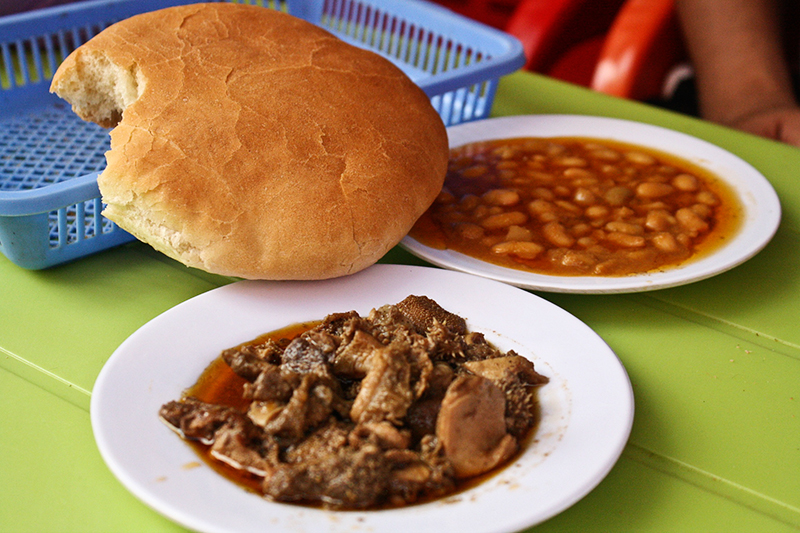 Simple Moroccan street food. Photo by Amanda Mouttaki
Simple Moroccan street food. Photo by Amanda Mouttaki
What you’ll find on the streets will depend on which city you are in. Each has its own special foods or twists on foods you’ll find across the country. You’ll find some stalls open all the time however, the majority of vendors open at night. Likewise there’s no best time to go – it will depend a lot on the specific shop you are visiting. I know of one shop in Marrakesh where the man only makes one thing. He opens at 11am and by 1pm everything is gone! Moroccans want their food hot, fresh, and delicious so don’t worry too much about food spoilage as nearly everything is made and consumed in the same day. Some guidebooks and “experts” may tell you to bring your own cup or silverware to eat with – I’ve never seen this done and would say it’s probably not necessary. One of the cheapest street foods you can get is fresh fruit. It’s all local, plentiful, and inexpensive.
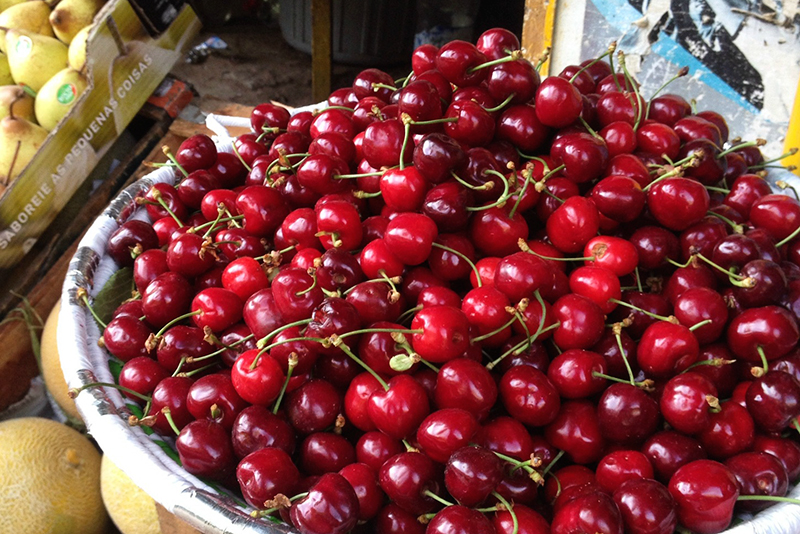 You can’t go wrong with local produce. Photo by Amanda Mouttaki
You can’t go wrong with local produce. Photo by Amanda Mouttaki
8) Money matters.
Cash is king in Morocco. There are places that take credit cards but you should always assume that they won’t. ATM’s are almost everywhere and are safe and easy to use. Have cash ready and never expect to be able to use a credit card. Also keep in mind that the tipping culture that exists in North America isn’t customary in Morocco. Leaving a small tip is more than acceptable. This is something you’ll want to meter depending on the establishment. A hole-in-the-wall eatery may only require a few dirham (5-10%) tip but the staff at a 4 star restaurant will expect a tip somewhat closer to 15%. You might also find that bathrooms are serviced by attendants. It used to be quite common that you would tip the attendants but this is going out of style. However, should you find yourself faced with this situation, a dirham or two is sufficient.
9) Drinking alcohol will cost you
Morocco is a Muslim country, however it is legal to sell alcohol to foreigners. Morocco even has its own breweries and wineries! You will find that alcohol is quite expensive, especially compared to prices in Europe and North America. In large cities many, many restaurants serve beer and wine but if you’re visiting smaller cities you may have to hunt down an alcoholic beverage or not be able to find any alcohol at all. Usually, you won’t encounter much difficulty but may need to ask around a little to find specific items. The only time you may face difficulties in getting alcohol at all is during Ramadan. Alcohol sales stop 10 days before this holiday, throughout the month, and the during the 10 days that follow.
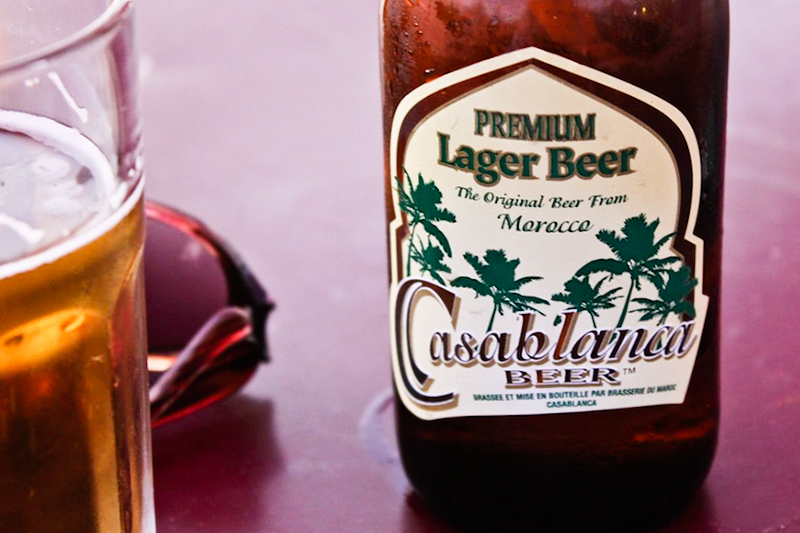 Casablanca, Morocco’s premium lager. Photo by Richard Allaway via CC
Casablanca, Morocco’s premium lager. Photo by Richard Allaway via CC
10) There is no reason to worry over health and safety.
Working in the food and travel industry I regularly hear from people that they are worried about food safety in Morocco. This is a legitimate concern whenever traveling. But, Morocco is really no different from any other place. Simple precautions like drinking bottled water whenever possible, avoiding ordering meat cooked rare, always opting for freshly cooked items and making sure raw foods like fruit and veggies are washed will go a long way to keep your stomach happy. Morocco has a rich history of herbal medicines. If you do find yourself under the weather, you can pop into one of the many local natural pharmacies for a remedy. A spoonful of cumin is often ingested for gastrointestinal issues, and there are numerous teas brewed to relieve different symptoms. Often times, you can even ask your riad or hotel for help with your particular ailment and they can get you something that will work. If you prefer a western medical approach, there are full-service pharmacies everywhere and very few things in Morocco actually need a prescription to acquire. Walk in, tell them your symptoms, and the pharmacist will set you up and on your way. Medicine in Morocco is also very inexpensive. Whatever you do, don’t let the fear rumors stop you from eating amazing Moroccan food!
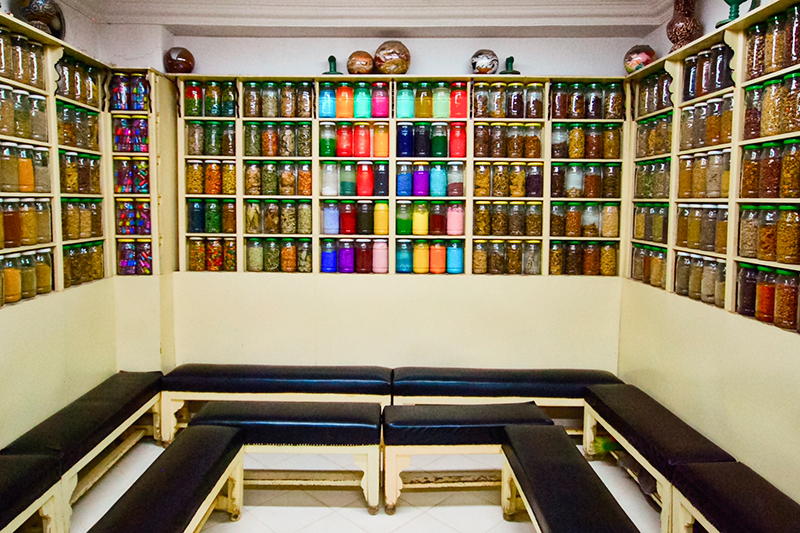 Natural remedies at a Moroccan pharmacy. Photo by Cloudzilla via CC, adapted by ParTASTE
Natural remedies at a Moroccan pharmacy. Photo by Cloudzilla via CC, adapted by ParTASTE
Have you ever been to Morocco? Tweet us or visit us on facebook to share you’re tips and favorite things about eating in this colorful country!
